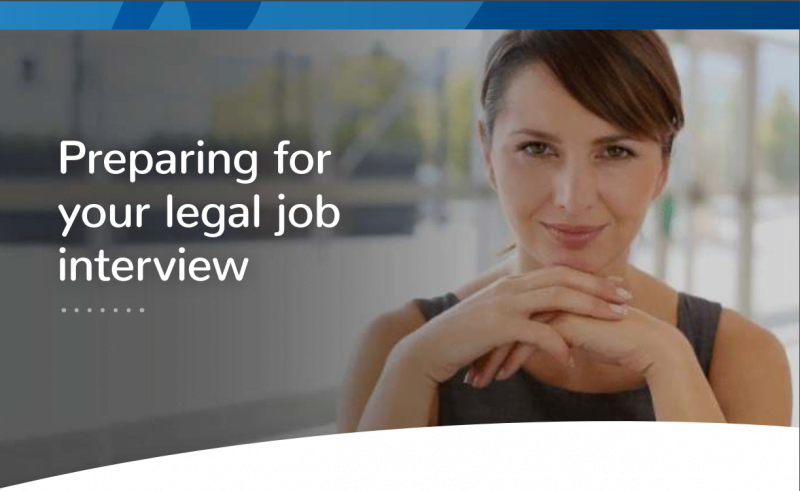Referral program.. it pay$ to have friends

We are urgently looking for Lawyers of all levels to fill a variety or roles. In fact, so much so, that if you tell your friends about us, we place them and they pass their probationary period, we will reward you with $1000. What are you waiting for.. make a referral today!
Preparing for your legal job interview

You only have one shot to make a great first impression so excellent preparation is the key to a successful interview. Some of the key fundamentals include: Dress appropriately. How you dress tells your prospective bosses a great deal about who you are and the kind of employee you would be. You should wear appropriate business attire. Be warm and polite with absolutely everyone that you meet and speak with during the interview process – that receptionist likely has significantly more influence in the hiring decision than you realise. Say it out loud. You should rehearse out loud your personal elevator pitch on why you are a great fit for the role, while also practise saying out loud 2-3 “mini case studies” from your career that highlight your strengths and suitability for the role. Be prepared to answer the “tell me about yourself” question. Voicing out loud prior to the interview will help you then be more natural during the interview. Take copies of your CV, cover letter and academic transcripts just in case they are required. Be prepared to deal with areas of concern. These may include gaps between roles or education, sudden changes in job direction or inadequate results. Everyone has weaknesses apparent within his/her CV. Avoid appearing regretful, protective or insecure and be agreeable to discuss these weak areas briefly but freely. It is likely that near the end of the job interview you will be given the time and opportunity to ask your own questions. So it’s a great idea to anticipate this with some well prepared questions on areas that may not have come up during the actual interview itself. For additional career advice contact Jason Elias on [email protected]
Negotiating your salary in a declining job market

As quoted in Legal Practice Intelligence Publication | 7 November 2019 Since May 2019, the number of Solicitor positions advertised on the internet* has declined each month. For each of those months the decline has been getting bigger as a percentage compared to the previous year. Job ads for Solicitors in September 2019 were down by 11% compared to September 2018. This is almost double the decline compared to the all-occupations category. Director at Elias Recruitment Jason Elias says “Much like interviews, successful salary negotiation happens BEFORE any conversation. Being well prepared will make you a lot more successful. Know industry ranges so that you know what is realistic for any given role. An excellent resource is the www.legalsalary.com.au website which is a real time database of actual salaries. Feel free to add yours and see a comparison. Glassdoor while not legally specific may have some useful information. Always remember that it is a collaboration – not a fight. Speak with your recruiter about what is realistic.” [read the full article here…]
Getting your CV ready

A study by The Ladders found that professional recruiters give most resumes an initial 6 second review to look at key details before deciding whether to contact you for an interview. During that 6 second window recruiters are quickly scanning: Name Current title and employer Current position start date – and if you are still employed Previous employers’, title, company and employment dates Admission date (years of Post qualification experience (PQE) Education ( and awards eg Dean’s List or Average marks- esp in earlier years) Clearly lay out your CV so that visually you are giving the recruiter exactly what they are looking for as quickly as possible to increase your chance of scoring an interview. Avoid fancy fonts, boxes and unnecessary distractions. Here is how to spruce up your resume in four easy steps: Highlight your accomplishments, recent projects, & publications –Lead with your accomplishments, especially if you have recent project experience relevant to the role for which you are applying. Include any awards, commendations or industry publications – highlight your expertise in an area relevant to that role and you will stand out from other applicants. Don’t forget the selection criteria –Selection criterias are listed for a reason, so include them in your application. Wherever possible, tailor your CV to reflect the specified criteria. Note relevant skills or experience, and focus on demonstrating achievements in your recent position that match the role requirements. Leave any material which may be the basis of discrimination (unconscious or otherwise ) – for example, date of birth, race, marital status, sexuality or religion. Make it an easy read –The worst resumes are a nightmare to read. Poor formatting, too much text, an absence of headings, or lack of clarity around what you did in each role make for a quick trip to the bin. As a rough guide, ask yourself, can your CV be read in 2 minutes or less? Would a total stranger understand what value you brought to each role, your strengths and your achievements? If you’re unsure, run your resume by friends or family who are less familiar with your career or industry, and ask them to describe what you do based on your resume. In terms of length, aim for 2 pages for a junior lawyer and up to 4 for a more senior lawyer. Provide more detail on more recent roles, If you have 10 years PQE we don’t need much about your pre-legal work at McDonalds. Mention it of course (McDonalds gives great training) but prioritise the more relevant positions. Also even if you look like George Clooney or Scarlett Johansson- a photo on your CV is never appropriate. Explain any absences or short stints – and don’t embellish –Red flags pop up for unexplained leaves of absence and unusually short placements in a series of roles. While innocuous, these resume gaps may suggest underlying issues with colleagues or managers or an inability to focus and settle into a role. If you took extended time off, be up front about the reason – whether it was a career break to assist with an ill family member or a business venture or even further study, it’s best to tackle the issue rather than allow employers to come to their own conclusions and prematurely rule you out. Whatever you do, don’t lie. Not only does it damage your credibility with your prospective employer, it may affect your overall reputation with future employers. For additional career advice contact Jason Elias on [email protected]
What lawyers should ask before making the switch

As quoted in Lawyers Weekly 1 August 2019 With competition for talent at a record high, lawyers are presented abundance of choice in terms of their employer, however, an expert in the space says there are six things to consider before shaking up their career. Director at Elias Recruitment Jason Elias said before taking the leap and changing jobs, one must consider several factors. “Before you take the leap, take a moment to ask yourself the following questions: One – Am I being challenged in my current role? Two – Am I still learning? Three – Do I feel respected and appreciated? [Read more…]
Massive upswing in jobs in Q1 FY2019- Elias Legal Job Index

The first quarter of the 2018/19 Financial Year has seen an incredible 58% surge in advertised legal job vacancies from the previous quarter, according to the Elias Legal Jobs Index. In total we reviewed 380+ roles in NSW and 230 in Victoria in the research. The practice area with the greatest increase was insurance law, with an increase of 133% from the final quarter of FY2018. There was also similar significant growth in the number of in-house roles, increasing by 125% quarter on quarter. Banking and finance legal jobs grew 95% from Q4 to Q1, which may potentially be attributed to the Royal Commission and its flow-on effects. Corporate and M & A are still very active reflecting the positive economy, and the litigation sector also saw strong growth. There was a moderate increase in personal injury and property roles. The practice areas that saw fewer roles advertised than the prior quarter included Employment, Energy, and Regulatory. There was a dramatic dip in family law roles with one third the vacancies of the previous quarter. When reviewed by seniority, the highest numbers of jobs available and listed is still with the Middle Associate/ Manager Position, leading the field with 292 positions available. This was up 37% from the previous quarter. The second most prolific job positions is Senior Associate/ Manager. Advertised vacancies at this level grew from 89 positions to 148 positions from Q4 FY18 to Q1 FY19, representing a 66% increase.There was also a massive increase in junior associate roles, rising from 13 to 43. This may also be in part due to the need for junior lawyers with the various Royal Commissions underway. There was a large growth in the number of Department of Division Heads and Director level roles. The buoyant jobs market means that there are some excellent opportunities for those seeking to further develop their career. However, it is worth noting that previous Elias Legal Jobs Index reports have shown that the 1st quarter is often one of the most active of the year. Area Q4 FY18 Q1 FY19 % change Banking & Finance 22 43 95% In House 12 27 125% Corporate/M&A 36 55 53% Employment 25 22 -14% Energy 10 8 -25% Family 15 5 -66% Insurance/Reinsurance 15 35 133% Litigation/Dispute 61 91 49% Personal Injury 14 16 14% Real Estate 63 68 8% Regulatory 10 8 -20% TOTAL 283 378 33% Seniority Q4 FY18 Q1 FY19 % Change Department/Div Head 3 15 400% Director 2 9 350% Graduate / Entry 6 9 50% Junior Associate / Manager 13 43 230% Mid Associate / Manager 213 292 37% Snr Associate / Manager 89 148 66% TOTAL 326 516 58%
Spruce up your resume in four easy steps

Recruitment season is fast approaching. If you’re looking to make your next move this year, it’s prime time to sharpen or ‘smarten’ your resume! Here are four tips to ensuring your resume gets noticed by recruiters and potential employers. 1. Highlight your accomplishments, recent projects, publications Lead with your accomplishments, especially if you have a recent project experience relevant to the role for which you are applying. Include any awards, commendations or industry publications – highlight your expertise in an area relevant to that role and you will stand out from other applicants. List your education/ qualifications, including degrees and graduating year, practising certificate, dates of admission and jurisdictions. 2. Don’t forget the selection criteria Selection criterias are listed for a reason, so don’t neglect them from your application. Wherever possible, tailor your resume to reflect the specified criteria. Note relevant skills or experience, and focus on demonstrating achievements in your recent position that match the role requirements.Leave any material which may be the basis of discrimination, unconscious or otherwise – for example, date of birth, marital status, children or religion. 3. Make it an easy read The worst resumes are a nightmare to read. Poor formatting, too much text, an absence of headings, or lack of clarity around what you did in each role make for a quick trip to the bin. As a rough guide, ask yourself, can your resume be read in 2 minutes or less? Would a total stranger understand what value you brought to each role, your strengths and your achievements? If you’re unsure, run your resume by friends or family who are less familiar with your career or industry, and ask them to describe what you do based on your resume. In terms of length, aim for 3-4 pages.A classic resume format to follow is available here. 4. Explain any absences or short stints – and don’t embellish Red flags pop up for unexplained leaves of absence and unusually short placements in a series of roles. While innocuous, these resume gaps may suggest underlying issues with colleagues or managers or an inability to focus and settle into a role. If you took extended time off, be up front about the reason – whether it was a career break, to assist with an ill family member or a business venture, it’s best to tackle the issue rather than allow employers to come to their own conclusions and prematurely rule you out. Whatever you do, don’t lie. Not only does it damage your credibility with your prospective employer, it may affect your overall reputation with future employers. Keen to tune up your resume for a new role? Contact us via email or phone (02) 9555 5711 for tips or a career chat.
Legal market cools slightly in Second Quarter FY18
The end of 2017 saw a slight drop in legal hiring, with a slight 4.49% decrease in legal jobs advertised from the first to second quarter FY18. This may in part be due to the Christmas break, with many offices winding down activity over summer. This reflects an overall buoyancy in the legal market, led by property, Corporate/ M&A and litigation roles. In-house positions enjoyed strong growth, with 30 in-house jobs advertised across Company/ Commercial and Corporate/ M&A. This marked a 200% increase on the previous quarter. Other sectors to contract included Company/ Commercial, Property, Banking/ Finance, Insurance, IP/ Technology/ Media, Employment, Tax, and Competition/ Compliance. However, several sectors experienced some growth, including Energy, Insolvency, Corporate/ M&A, Criminal and Pro Bono. The end of the calendar year saw relatively steady hiring figures in Litigation/ Dispute Resolution, Personal Injury and Family Law, according to the Elias Legal Jobs Index. Major gains in energy and in-house The Energy sector was one of the biggest winners in the second quarter of FY18, with a jump from 1 position to 5 over the two quarters. This may reflect Australia’s shift to renewables as energy costs soar, with NSW now receiving one-fifth of its energy from renewable sources. Increasing compliance requirements ahead of the Federal Government’s new National Energy Guarantee may also be bumping up demand for energy lawyers. In-house also made gains as companies, banks and the Big 4 bulked up on internal teams. Banks represented 26% of in-house hires in the second quarter of FY18. As an area consistently in demand, this will be good news for many lawyers currently in private practice. The upshot? With legal hires continuing to be steady despite increasing competition from New Law and the Big 4, it’s a promising market for candidates. The full picture See the table below for a complete breakdown of where each vacancy was across Q1 2018 and Q2 2018: Area Q1 2018 Q2 2018 % change Company/Commercial 27 25 -7.41% Corporate/M&A 39 45 -15.38% Property 56 30 -46.43% Banking/Finance 37 25 -32.43% Litigation/Dispute Resolution 56 54 -3.57% Insurance 29 20 -31% IP/Technology/Media 31 14 -55% Tax 5 2 -60% Personal Injury 13 12 -7.7% Employment 17 11 -35.29% In-house 33 45 +36.36% Family 7 6 -14.29% Insolvency 0 2 NA Competition/ Compliance 13 9 31% Energy 1 5 +400% Pro-bono 1 2 +100% Criminal 1 3 +200% Jason Elias runs Elias Recruitment, a boutique legal recruitment consultancy that specialises in finding lawyers for law firms, NFPs and corporate in-house teams. For more information, email [email protected]
How to future-proof your legal career in the age of Robots
New Law, disruption, legaltech – these buzzwords herald a shift in how the legal profession sees itself, innovations in technology drive down costs and clients demand more for less. There’s good news however, the doom and gloom around robots coming for the jobs of lawyers is largely unfounded. A recent survey by the Law Society of England & Wales suggested that AI’s impact to the number of legal jobs is minimal – less than 1% – with legal staffing having already peaked in 2009. Artificial Lawyer has predicted further growth in demand for legal services, particularly among larger commercial enterprises, with AI set to serve the often underserviced consumer legal market. Do robots dream of electric lawyers? With the market for legal services set to grow, we can rest assured robots are not coming for our jobs. However, major shifts in technology will demand a vastly different kind of lawyer – equipped with a broader, more human-centric skillset. As technology increasingly assumes the dull, repetitive aspects of legal work, the lawyer of the future needs to do what robots can’t – be more human. What are the skills of the future lawyer? Gone are the days of lawyers memorising hundred page judgements or perfecting total recall of legislation. Just as many law schools have done away with closed book exams, mastery of core legal knowledge sits as a skill alongside an array of more business-oriented, client-focussed skills. Technology allows lawyers to swiftly search and analyse law; its next iteration will allow simple legal problems to be resolved – with services like Allira and Get Free Legal Advice (NZ) allowing for a functionality akin to ‘Siri for law.’ So what skills will future lawyers need to possess to remain relevant? Emotional intelligence/ empathy Law has always been about more than the technical work of applying law to a client’s matter. Understanding what a client wants and requires, and acting effectively in the best interests of a client necessitates a nuanced view of human motivations. This is particularly true in emotionally-charged areas of practice such as family law, but mastery of cultural mores is equally important in a commercial context so lawyers can deliver services clients find valuable. Business acumen to better advice commercial clients Repositioning the lawyer’s role as more of a consigliere with an intimate understanding of the client’s business goals, politics and challenges is essential to ensuring ongoing legal work is seen as relevant and valuable. Lawyers acting as trusted advisors, as opposed to ‘firefighter’ lawyers used only in case of legal emergencies, are far more valuable to clients – intimate knowledge of a client’s business allows them to proactively address potential legal risks long before they become costly and complex. Networking and business development Technology is now automating much of the mundane legal work long the bane of lawyers, especially junior lawyers. As a result, the future lawyer will be encouraged to skill up in business development much earlier in their careers. Relationships with clients, current and new, will emerge as the future lawyer’s major asset. Tech-savvy early adopters Lawyers are often seen as luddites. The profession is a latecomer to digital disruption; some lawyers still insist on printing all correspondence. In terms of technology, however, resistance is increasingly futile – the future lawyer is a tech-savvy early adopter, open-minded and eager to embrace ways technology can make their work more efficient. Firms who fail to consistently update technology to optimise workflow risk being left behind – and priced out of the market by more efficient competitors. Interested in finding out more about recruiting for the future of law? Follow us on Facebook or LinkedIn, or explore technology CPD courses on Bulletpoints.
Recruiting lawyers ready for digital disruption
Digital disruption, AI (artificial intelligence), legaltech – all these phrases have become synonymous with the change affecting traditional private practice. Lawyers are facing competition from unexpected quarters – the ‘Big 4’ professional services firms expanding their legal teams, while the ranks of in-house counsel also grow. In addition, startups and disruptive technology are turning their attention to the legal profession, hoping to address simple queries via AI-powered chatbots, streamline and automate due diligence workflow or predict judgements or the compliance requirements of new regulations. In the midst of this slew of technological activity, lawyers are increasingly asking how best they may adapt to remain relevant as the role of the lawyer evolves. To future-proof your legal career, Elias Recruitment has compiled a few useful tips. Gain exposure to legaltech Wherever possible, gain an understanding of what is happening in terms of tech disruption. For example, Gilbert + Tobin and the Centre for Legal Innovation recently hosted the AI in Legal Practice Summit, which featured Heads of Innovation from major firms and legal entrepreneurs developing apps and tech solutions for the profession. In attendance were not merely technology lawyers but also in-house counsel from universities and industry bodies, as well as lawyers in private practice. Conferences, roundtables and events like this offer lawyers an opportunity to understand key trends emerging in the profession, and become champions of change within their organisations. To code or not to code? It’s a matter of a debate as to whether lawyers should learn to code. Some firms have run workshops on introductory coding for their lawyers, simply to allow lawyers to better understand their clients’ business. While there is no suggestion that lawyers should become proficient in coding and development, it is clear that lawyers who do possess a working knowledge of new technology are more likely to recognise and adapt to its applications. Get involved in internal tech projects Firms are increasingly adopting new technology to innovate and improve efficiencies, especially for labour-intensive legal tasks like due diligence and discovery. Get involved in pilot projects designed to test drive new technology, and be among the first tech-literate lawyers in the firm and the profession. So what does this mean for me? Adapting to a changing profession does not strictly mean lawyers need to become expert technicians, developers or app inventors. Rather, future-ready lawyers will remain relevant by improving their exposure and understanding to emerging technology and its applications to what they do. Interested in learning more? Visit Bulletpoints.com.au to browse the range of legal courses available.